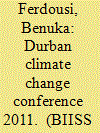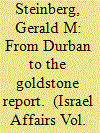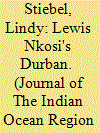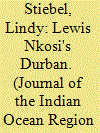|
|
|
Sort Order |
|
|
|
Items / Page
|
|
|
|
|
|
|
| Srl | Item |
| 1 |
ID:
104029


|
|
|
|
|
| Publication |
2011.
|
| Summary/Abstract |
This paper examines the ability of civil society leaders in Durban, South Africa to champion environmental justice in an industrial risk society. It presents viewpoints from key social actors at the Durban city level, including three local case sites, to examine civil society leadership capacity to achieve environmental justice by addressing grassroots concerns. It explores how leaders engage with other civil society actors and subsequent responses towards government and industry. The paper compares the urban regional and case studies analyses and highlights that although post-apartheid civil society leadership is not built from the anti-apartheid leadership, changed civil society leadership during the transition has influenced contemporary leadership in Durban, addressing industrial risks. New opportunities and challenges have resulted in the emergence of limited leaders championing industrial risks such as individualized leaders hindering wider collective actions against risks, including engagement in formal technical processes as opposed to mobilizing people. Not only is new and collective interest in civil society leaders required to mediate between classes, communities and the state and capital, but leaders also need to strategically combine the social and industrial pollution issues for solidarity in order to achieve environmental justice.
|
|
|
|
|
|
|
|
|
|
|
|
|
|
|
|
| 2 |
ID:
117743


|
|
|
|
|
| Publication |
2012.
|
| Summary/Abstract |
Climate change can be termed as the greatest challenge of the 21st century as the very existence of human civilisation on the planet Earth is at stake. It is, therefore, imperative to assess the United Nations (UN) Climate Change Conferences in order to see how far the world leaders have progressed to work out a climate regime capable of avoiding irreversible and catastrophic change in climate. This paper aims to make an assessment of the latest UN Climate Change Conference which was held in 2011 in Durban, South Africa. Besides presenting the outcome of the conference, the paper attempts to underline the factors that led to this outcome and analyses the role of different countries in this regard. The paper argues that climate change is not merely an issue of natural science; rather it is very closely linked to global economic and political structures. Hence, what is happening in UN climate negotiations is a reflection of global politics.
|
|
|
|
|
|
|
|
|
|
|
|
|
|
|
|
| 3 |
ID:
193200


|
|
|
|
|
| Summary/Abstract |
This article probes the rural economic development approach in selected informal settlements in Durban and how such approach affects the vulnerability of local Black women to flood impacts within the areas. Qualitative data for the study were gathered through semi-structured interviews and focus group discussions with 25 local Black women from Inanda, Ntuzuma, KwaMashu and Umlazi. Five key informants from the eThekwini (Durban) metropolitan municipality were also interviewed. Findings from the study showed that although there is improved economic development in the selected settlements, which constitute informal settlements designated for Black South Africans during the apartheid era, such an economic development approach has not significantly improved the livelihoods and adaptive capacity of the local women. The article suggests a multidimensional approach to development that is practical, inclusive and equitable, and addresses local women’s challenges associated with climate adaptation and sustainable livelihoods.
|
|
|
|
|
|
|
|
|
|
|
|
|
|
|
|
| 4 |
ID:
108874


|
|
|
|
|
| Publication |
2011.
|
| Summary/Abstract |
COP16 of the UNFCCC at Cancun is regarded as a success, compared to the frustrating outcome at Copenhagen. However, the success part relates only to several issues of adaptation. The frustrating aspect is the mitigation part of the regime, which is the ultimate solution, but it remains as intractable as ever. This paper raises few queries including why there were some successes in adaptation, and not any in mitigation. The author argues that nothing positive in this regard at Cancun or any likelihood of its progress in the foreseeable future prodded the industrial countries to agree to some positive steps in adaptation. Still important issues regarding climate finance remain unresolved. Further, a realpolitik approach to upholding national interests and adherence to conventional sense of sovereignty by the major emitters, particularly by the US, stand in the way. The paper ends with a few suggestions on how to put pressure on the emission powers to listen to the call of the day.
|
|
|
|
|
|
|
|
|
|
|
|
|
|
|
|
| 5 |
ID:
113989


|
|
|
|
|
| Publication |
2012.
|
| Summary/Abstract |
Disproportionate and unsubstantiated allegations of human rights violations, war crimes and racism have been employed as a form of political warfare designed to isolate Israel internationally. This strategy, based on the model used to defeat the apartheid government in South Africa, was adopted in 2001 at the NGO Forum of the UN-sponsored Durban Conference on racism, in which 1500 organizations participated. Since then, as demonstrated in this article, many human rights NGOs have consistently supported the political agenda of the Organization of the Islamic Conference (OIC), whose members dominate the UN Human Rights Council. In the decade following the Durban conference, the NGO network has issued frequent condemnations of Israel based on false or unverifiable allegations of human rights abuses and 'war crimes'. The NGO campaigns, led by international groups such as Human Rights Watch and Amnesty International, are central in this process, from Jenin (2002), through the UNHRC's Goldstone Report on the Gaza war (2009). Journalists, academics, diplomats, political leaders, and legal officials in liberal Western democracies frequently cite these generally unsubstantiated allegations in condemning Israeli policies, reflecting the 'soft power' of these NGOs acting to reinforce the Palestinian narrative and the objectives of the OIC.
|
|
|
|
|
|
|
|
|
|
|
|
|
|
|
|
| 6 |
ID:
125895


|
|
|
|
|
| Publication |
2013.
|
| Summary/Abstract |
Lewis Nkosi, the late exiled South African writer, and the city of Durban, an extended urban space of an estimated 3 million inhabitants, are incontrovertibly linked. This sprawling Indian Ocean town is where Nkosi was born, where he was educated as a small child, where he started his working career, and where he was finally buried on 10 September 2010. Given the centrality of Durban to Nkosi's life story, it is unsurprising that this city periodically appears in Nkosi's writing, both fictional and non-fictional, as a geographical 'setting' but also as a symbol of political change in South Africa. This paper, then, begins an evaluation of the role of 'Durban' and the Indian Ocean in the life and work of Nkosi, drawing from his novel Mating birds, and also from a little known article published in a Swiss newspaper, translated into German. Durban emerges from these various sources as a city in flux, a place of startling contrasts, a melting pot of peoples and a dream space called 'home' for this celebrated writer.
|
|
|
|
|
|
|
|
|
|
|
|
|
|
|
|
| 7 |
ID:
130645


|
|
|
|
|
| Publication |
2013.
|
| Summary/Abstract |
Lewis Nkosi, the late exiled South African writer, and the city of Durban, an extended urban space of an estimated 3 million inhabitants, are incontrovertibly linked. This sprawling Indian Ocean town is where Nkosi was born, where he was educated as a small child, where he started his working career, and where he was finally buried on 10 September 2010. Given the centrality of Durban to Nkosi's life story, it is unsurprising that this city periodically appears in Nkosi's writing, both fictional and non-fictional, as a geographical 'setting' but also as a symbol of political change in South Africa. This paper, then, begins an evaluation of the role of 'Durban' and the Indian Ocean in the life and work of Nkosi, drawing from his novel Mating birds, and also from a little known article published in a Swiss newspaper, translated into German. Durban emerges from these various sources as a city in flux, a place of startling contrasts, a melting pot of peoples and a dream space called 'home' for this celebrated writer.
|
|
|
|
|
|
|
|
|
|
|
|
|
|
|
|
| 8 |
ID:
081714


|
|
|
|
|
| Publication |
2008.
|
| Summary/Abstract |
This article, written in response to recent arguments about whether or not shack dwellers can exercise historical agency, outlines the history of shack dwellers' struggles in the South African city of Durban. The sections looking at struggles under colonialism and apartheid and the nature of the post-apartheid deal with regard to housing draw on the extensive literature on these questions. The final section, which gives an outline of the emergence, nature and experience of the shack dwellers' movement, Abahlali baseMjondolo, is written from a first-hand engagement. The article concludes that in contemporary Durban organized shack dwellers are constituting a major challenge to technocratic conceptions of democracy
|
|
|
|
|
|
|
|
|
|
|
|
|
|
|
|
| 9 |
ID:
081715


|
|
|
|
|
| Publication |
2008.
|
| Summary/Abstract |
Shackdweller communities are among the most impoverished and exploited on the planet. With nearly 1 billion people living in them, one might consider them to be hotbeds of radicalism. Yet, in fact, very few settlements have become disobedient. Using the work of S'bu Zikode of the Abahlali baseMjondolo Shackdwellers Movement (South Africa) and the work of Alain Badiou, I show how politics is lived in Durban's shacks, and show how Badiou's thoughts supplement a series of uniquely African instances of politics
|
|
|
|
|
|
|
|
|
|
|
|
|
|
|
|
| 10 |
ID:
140132


|
|
|
|
|
| Summary/Abstract |
Globalisation and post-colonialism have created new religio-cultural geographies and articulations in many countries. Many aspects of Hindu religion have been transnationally stretched and (re)enacted within new migrant and diasporic spaces, in turn reshaping and somewhat changing how ritual and religious enactments come to be enunciated. This article focuses on the yajna as a plastic and symbolic resource that is enacted in a transnational context and within new idioms and vocabularies of religious expression. The article engages with Lubin’s (2001) thesis that the ‘public’ and visible aspect of yajna functions as a civic ‘spectacle’ and probes the performance element of this so-called ‘spectacle’, and looks at how it becomes re-ritualised and re-enacted to fit the contemporary needs of transnational and diasporic Hindu communities.
|
|
|
|
|
|
|
|
|
|
|
|
|
|
|
|
|
|
|
|
|